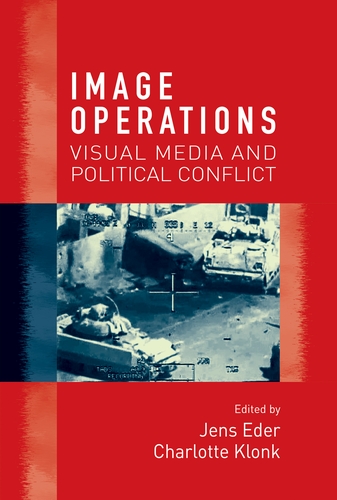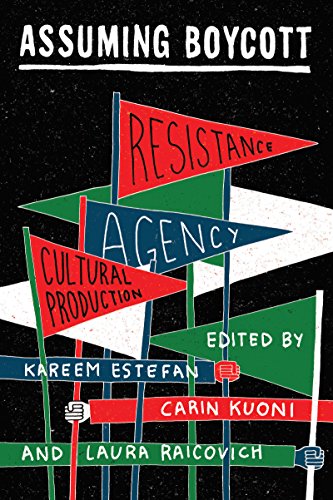Jens Eder, Charlotte Klonk (eds.): Image Operations: Visual Media and Political Conflict (2016)
Filed under book | Tags: · activism, image, media activism, photography, politics, social movements, video, visual culture, war

“Still and moving images are crucial factors in contemporary political conflicts. They not only have representational, expressive or illustrative functions, but also augment and create significant events. Beyond altering states of mind, they affect bodies and often life or death is at stake. Various forms of image operations are currently performed in the contexts of war, insurgency and activism. Photographs, videos, interactive simulations and other kinds of images steer drones to their targets, train soldiers, terrorise the public, celebrate protest icons, uncover injustices, or call for help. They are often parts of complex agential networks and move across different media and cultural environments. This book is a pioneering interdisciplinary study of the role and function of images in political life. Balancing theoretical reflections with in-depth case studies, it brings together renowned scholars and activists from different fields to offer a multifaceted critical perspective on a crucial aspect of contemporary visual culture.”
Publisher Manchester University Press, Manchester, 2016
ISBN 9781526107213, 152610721X
xv+232+[24] pages
Review: Zoya Brumberg (Journal of Visual Culture, 2018).
PDF (21 MB)
Comment (0)Kareem Estefan, Carin Kuoni, Laura Raicovich (eds.): Assuming Boycott: Resistance, Agency, and Cultural Production (2017)
Filed under book | Tags: · activism, agency, apartheid, art, cultural production, cultural resistance, israel, palestine, politics, protest, resistance, south africa

“Boycott and divestment are essential tools for activists around the globe. Today’s organizers target museums, universities, corporations, and governments to curtail unethical sources of profit, discriminatory practices, or human rights violations. They leverage cultural production – and challenge its institutional supports – helping transform situations in the name of social justice.
The refusal to participate in an oppressive system has long been one of the most powerful weapons in the organizer’s arsenal. Since the days of the 19th century Irish land wars, when Irish tenant farmers defied the actions of Captain Charles Boycott and English landlords, “boycott” has been a method that’s shown its effectiveness time and again. In the 20th century, it notably played central roles in the liberation of India and South Africa and the struggle for civil rights in the U.S.: the 1955 Montgomery bus boycott is generally seen as a turning point in the movement against segregation.
Assuming Boycott is the essential reader for today’s creative leaders and cultural practitioners, including original contributions by artists, scholars, activists, critics, curators and writers who examine the historical precedent of South Africa; the current cultural boycott of Israel; freedom of speech and self-censorship; and long-distance activism. Far from withdrawal or cynicism, boycott emerges as a productive tool of creative and productive engagement.
Including essays by Nasser Abourahme, Ariella Azoulay, Tania Bruguera, Noura Erakat, Kareem Estefan, Mariam Ghani with Haig Aivazian, Nathan Gray and Ahmet Öğüt, Chelsea Haines, Sean Jacobs, Yazan Khalili, Carin Kuoni and Laura Raicovich, Svetlana Mintcheva, Naeem Mohaiemen, Hlonipha Mokoena, John Peffer, Joshua Simon, Ann Laura Stoler, Radhika Subramaniam, Eyal Weizman and Kareem Estefan, and Frank B. Wilderson III.”
Publisher OR Books, New York, 2017
ISBN 9781944869434, 1944869433
276 pages
Reviews: Rebecca Wolff (H-AMCA, 2018), Kim Jensen (Mondoweiss, 2017), Marguerite Dabaie (Electronic Intifada, 2017), Robert Bryan (Tribes, 2017).
Series of seminars (Vera List Center, 2015, with videos)
Book launch (New School, 2017, with video)
Marina Gržinić (ed.): Border Thinking: Disassembling Histories of Racialized Violence (2018)
Filed under book | Tags: · borders, europe, immigration, migration, necropolitics, politics, race, racialization, racism, refugees

“Border Thinking: Disassembling Histories of Racialized Violence aims to question and provide answers to current border issues in Europe. Central to this investigation is a refugee crisis that is primarily a crisis of global Western capitalism and its components: modernization, nationalism, structural racism, dispossession, and social, political, and economic violence.
In this volume, these notions and conditions are connected with the concept of borders, which seems to have disappeared as a function of the global neoliberal economy but is palpably reappearing again and again through deportations, segregations, and war. How can we think about these relations in an open way, beyond borders? Is it possible to develop border thinking for a radical transformation, as a means to revolutionize the state of things? To do this, we must reconsider what is possible for the social and the political as well as for art and culture.”
With contributions by Ilya Budraitskis, Maira Enesi Caixeta, C.A.S.I.T.A., Yuderkys Espinosa Miñoso, Miguel González Cabezas, Marina Gržinić, Juan Guardiola, Çetin Gürer, Neda Hosseinyar, Njideka Stephanie Iroh, Adla Isanović, Fieke Jansen, Tjaša Kancler, Zoltán Kékesi, Betül Seyma Küpeli, Gergana Mineva, Musawenkosi Ndlovu, Stanimir Panayotov, Suvendrini Perera, Jelena Petrović, Khaled Ramadan, Rubia Salgado, Marika Schmiedt, Joshua Simon, Aneta Stojnić, Shirley Anne Tate, Göksun Yazıcı, Hiroshi Yoshioka.
Publisher Sternberg Press, Berlin, 2018
Publication Series of the Academy of Fine Arts Vienna, 21
ISBN 9783956793837
308 pages
via AkBild Vienna

